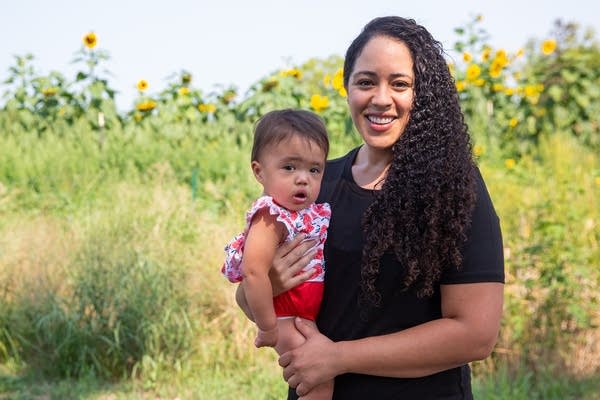Research: Black women at higher risk for preterm births during heat waves than white women
University of Minnesota study looks at connection between global warming and racial disparities.

Go Deeper.
Create an account or log in to save stories.
Like this?
Thanks for liking this story! We have added it to a list of your favorite stories.
Sarah Sanchez had a healthy pregnancy at 24 weeks. And then one especially hot day last summer, something didn’t feel right. She needed to take breaks during her walk. At first, she thought it might be the heat, getting to her.
“I had a feeling that something felt different with my pregnancy,” she said. “Something felt different — just with my body, and being so attuned to it, and paying attention — I knew that we were headed to something wrong.”
Something was wrong. Sanchez was in early labor. She was rushed to the hospital where she gave birth to her daughter Edith, who weighed just 1 pound and 9 ounces.
Preterm births occur year-round. Many factors can lead to preterm labor and birth. A specific medical reason is not always given, and it is concerning. Premature infants are more at risk for developing life-threatening medical conditions or chronic health issues. Researchers at the University of Minnesota’s School of Public Health investigating climate change and racial inequities are exploring a link between exposure to heat waves and occurrence of preterm births in the summer.
Turn Up Your Support
MPR News helps you turn down the noise and build shared understanding. Turn up your support for this public resource and keep trusted journalism accessible to all.
The groundbreaking research has not been previously conducted in Minnesota. Rachel Hardeman, professor at the U of M’s School of Public Health, worked with epidemiology researcher Luke Smith. They combined more than 150,000 birth records with temperature data in the Twin Cities over several years. Their most troubling finding was that college-educated Black women appeared more susceptible to health risks after heat wave exposure. They were 1.27 times more likely to experience premature labor and birth than white women without a college education.
Smith and Hardeman said that increased risk is significant. And it might have something to do with a phenomenon known as “the weathering effect.”
"One of the theories behind that is the idea of weathering or the weathering hypothesis, which basically describes how constant stress — the constant stress of racism — can potentially lead to premature biological aging and poor health outcomes," said Hardeman.
For Sanchez, a University of Minnesota graduate and community impact director at the American Heart Association who identifies as biracial, the stress she felt last year mattered.
During her pregnancy, Sanchez was renting a place in St. Louis Park with air conditioning available in only one room. She said it was extremely hot at home. Temperatures were high, and the Twin Cities were roiling with protests following the murder of George Floyd, a Black man killed by a white police officer.
“I've always wondered what that stress was like, on my body, as a woman of color, not knowing what the outcome would be,” said Sanchez. “And I just always think of that. The city was burning, and it was so hot. And all of that led to the birth of my daughter Edith.”
Edith spent almost two months on a ventilator. When she was discharged from the hospital, she needed supplemental oxygen at home. She celebrated her first birthday this summer. She still has some residual breathing difficulties, but Sanchez said she is doing well, and they are lucky.
She’s curious and tenacious, an explorer and she loves books, Sanchez said. Because of the pandemic, her exposure to others has been very limited. Edith has known her parents and a home nurse who has visited her infrequently.
“She’s getting used to seeing so many other people and seeing so much happen around her, and she loves it,” said Sanchez. “She’s a very happy little girl.”
Others may not have similar positive outcomes. Researchers say exposure to heat waves is an unhealthy stressor, and these can add up depending on a person’s experience, where they live or work. Some women may live in redlined neighborhoods, which have been racially segregated through discriminatory home loan policies. U of M researcher Smith said women in these neighborhoods are even more at risk during heat waves — it can be up to 7 degrees hotter in areas without amenities to mitigate the effects of hot weather.
"So, parks are cooler, water is cooler, forest is cooler. Neighborhoods that have been stripped of all their parks and have just basically open concrete, and concrete buildings are going to be much hotter,” said Smith. “And this is differentially seen across groups that have been redlined — that their neighborhoods have been redlined."
Dr. Tracy Prosen is a maternal fetal medicine specialist at Hennepin Healthcare. She said there is a good reason for why preterm births can increase during warmer weather.
"We know that when women are dehydrated, they tend to have more contractions,” said Prosen. “And so, in the summer months, people need to be drinking more water and aren't always drinking more water, to help keep themselves hydrated.”
Prosen advised those who are pregnant to stay hydrated and to seek medical care if they are experiencing symptoms of early labor.
This study adds to a small but growing subset of literature on climate change, racial inequities and reproductive health. Smith said we can expect to see more frequent weather events like heat waves in the coming years, and he hopes to add more findings from other cities, as heat waves continue in Minnesota and across the United States.



